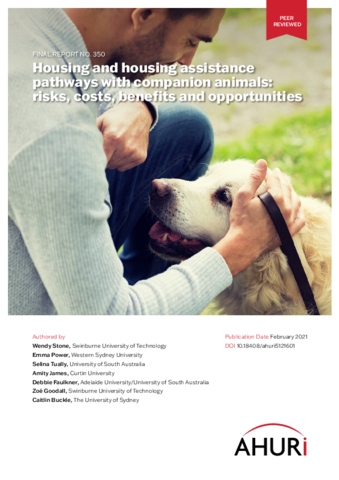This research examines the policy and regulatory settings that shape housing options available to households that own companion animals (also known as pets).
Over 60 per cent of Australian households include a pet, and more than half own at least one cat or dog. However, the right of households to keep pets varies markedly depending on the housing tenure within which they live (e.g. ownership, private rental housing, social housing, emergency/crisis accommodation, etc.).
The housing-connected costs of pet ownership are diverse and often tenure-specific. For renters, there can be fees associated with keeping pets, such as a pet bond at the start of a tenancy or cleaning fees at the end of a tenancy. In some markets, tenants report offering higher rent to encourage landlords to approve pets in an otherwise no-pets property.
Already vulnerable populations (e.g. elderly, low-income groups, the homeless and victims of domestic violence) are at greater risk of housing instability when owning pets. Pet relinquishment has been shown to spike at times of housing crisis, while other individuals may remain in unsafe and precarious living situations in order to keep their pets in the instance of domestic violence.
Recent policy debate seeks to manage the perceived risks of pet ownership within the private rental sector. In some jurisdictions there has been a suggestion that tenancy reforms could introduce an additional ‘pet bond’, paid by tenants who have a companion animal. Broader institutional housing reforms, such as rent fair enactments and the growth of the build-to rent sector, are also likely to increase the opportunity for progressive companion animal policies and practice.


